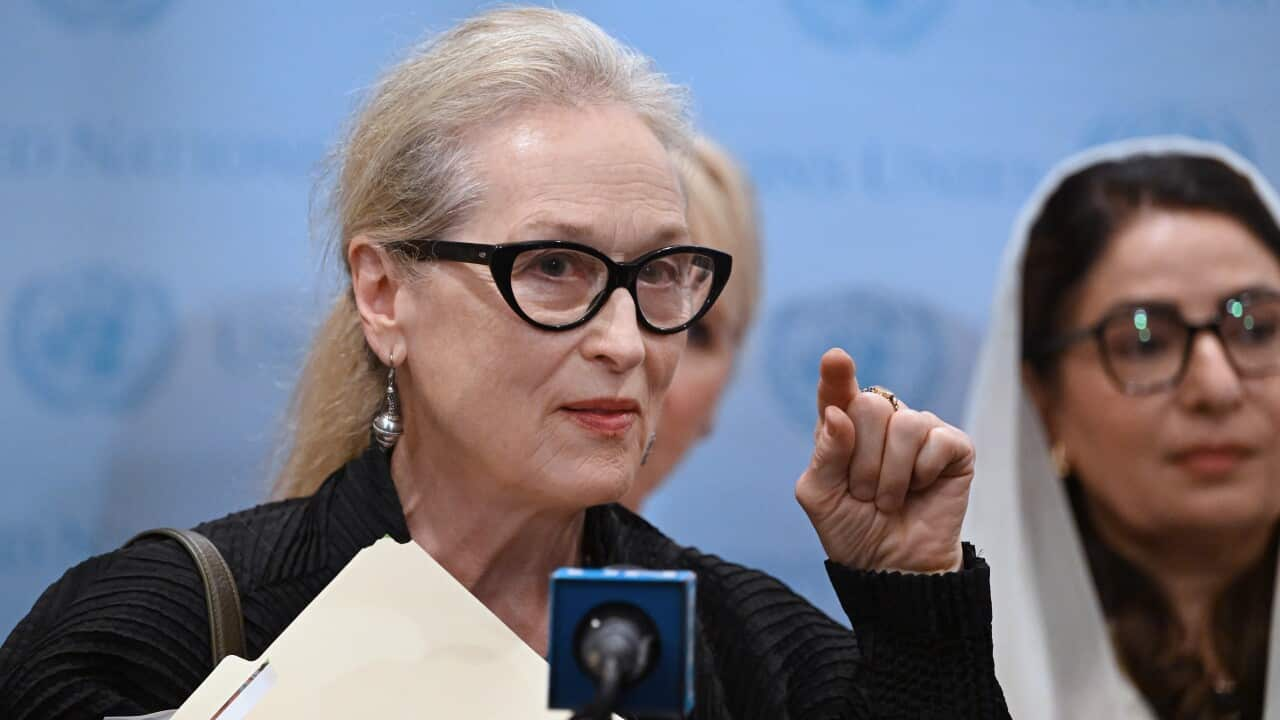Meryl Streep Condemns Taliban’s Repression of Afghan Women: “Cats Have More Freedom Than Women in Afghanistan”
At a United Nations event focused on the rights of Afghan women, renowned Hollywood actress Meryl Streep delivered a poignant speech, highlighting the extreme repression of women in Afghanistan under Taliban rule. Streep, a long-time advocate for human rights, lamented that in today’s Afghanistan, women and girls face such severe restrictions that even animals, like cats, enjoy more freedom than they do. Her remarks were a direct appeal to the international community to take urgent action to halt the Taliban’s escalating oppression.
)
Speaking on the sidelines of the UN General Assembly, Streep’s comments shed light on the devastating conditions that Afghan women are enduring, especially following the Taliban’s return to power three years ago. The regime has implemented a series of draconian “morality laws” that have stripped Afghan women of their most basic freedoms, including the right to education, work, and even movement within their communities.
The Brutal Reality of Women’s Lives in Afghanistan
Since seizing control of Afghanistan in 2021, the Taliban has systematically rolled back the rights of women and girls, introducing laws that severely limit their visibility and participation in public life. In August, the Taliban imposed yet another set of “morality laws,” further tightening restrictions. Among the most shocking of these measures is the rule that prohibits women from allowing their voices to be heard in public and forbids them from making eye contact with men they are not related to.
These rules only add to the already oppressive list of restrictions Afghan women have faced since the Taliban’s resurgence. Women are required to cover their entire bodies and faces when they leave their homes. They are barred from attending schools, entering public parks, going to gyms, or participating in sports. Their access to education and employment has been virtually eradicated, confining them to their homes in ways reminiscent of the Taliban’s first regime in the 1990s.
The dire situation prompted Meryl Streep to make an impassioned plea on behalf of Afghan women. “Today in Kabul, a female cat has more freedom than a woman,” Meryl Streep declared. She drew a stark comparison between the freedom of animals and the restrictions on Afghan women, emphasizing the absurdity and cruelty of the current situation. “A cat may go sit on her front stoop and feel the sun on her face, she may chase a squirrel in the park,” Meryl Streep said, underscoring the everyday liberties that Afghan women are denied. “A squirrel has more rights than a girl in Afghanistan today because the public parks have been closed to women and girls by the Taliban,” she added.
The metaphor, comparing the plight of Afghan women to the relative freedom enjoyed by animals, was a powerful illustration of the totality of the repression that women are facing. Streep warned that the actions of the Taliban not only violate the rights of Afghan women but also go against natural law itself. “A bird may sing in Kabul, but a girl may not in public. This is extraordinary. This is a suppression of the natural law,” she said.

The Taliban’s Response
The Taliban’s reaction to Streep’s comments was swift. Suhail Shaheen, the head of the Taliban’s political office, responded by stating that the regime “highly respected” women and that their rights were enshrined in Islamic law. However, he firmly rejected Meryl Streep’s comparison of Afghan women to cats, stating, “We never compare them to cats.”
Shaheen defended the Taliban’s policies, claiming that many women were still working in government ministries and private businesses. He argued that the regime’s decisions were aligned with Islamic Sharia law, asserting that the restrictions on education and public life were temporary, pending adjustments to the country’s education system.
Nevertheless, the reality on the ground tells a very different story. Despite repeated promises to readmit women to schools, the Taliban has made no concrete moves toward reopening educational institutions for girls. Women and girls remain largely confined to their homes, cut off from the opportunities that education and employment can offer. This isolation has led to widespread suffering and, in many cases, psychological trauma, as Afghan women struggle to adapt to the new reality of their lives.
A Global Call to Action
Meryl Streep’s speech was not just a critique of the Taliban but a call to the international community to take stronger action in defense of Afghan women. She urged world leaders to intervene and stop what she called the “slow suffocation” of Afghan women and girls. Meryl Streep’s remarks were echoed by United Nations Secretary-General António Guterres, who stressed that Afghanistan could never take its rightful place on the global stage without educated women and women in the workforce. “No country can succeed when half its population is oppressed,” Guterres emphasized.
The international community, led by Western nations like the United States and the European Union, has repeatedly condemned the Taliban’s treatment of women. However, these condemnations have had little impact on the ground, as the Taliban continues to defend its repressive policies under the guise of religious adherence. Many countries have imposed sanctions on the regime, but the Taliban remains unmoved, insisting that its actions are in line with Islamic principles.
The Way Forward
Meryl Streep’s speech serves as a stark reminder of the critical situation facing Afghan women. The plight of Afghan women is not just a domestic issue but a global human rights crisis that demands urgent action. As the Taliban continues to tighten its grip, the world must not turn a blind eye. Pressure on the regime must increase, and sustained diplomatic efforts must be made to ensure that Afghan women regain their basic rights and freedoms.
Without these efforts, the future for Afghan women looks bleak, and the repression that Meryl Streep so powerfully described will continue. The world must heed her call to stop the suffocation of women and girls in Afghanistan before it is too late.


